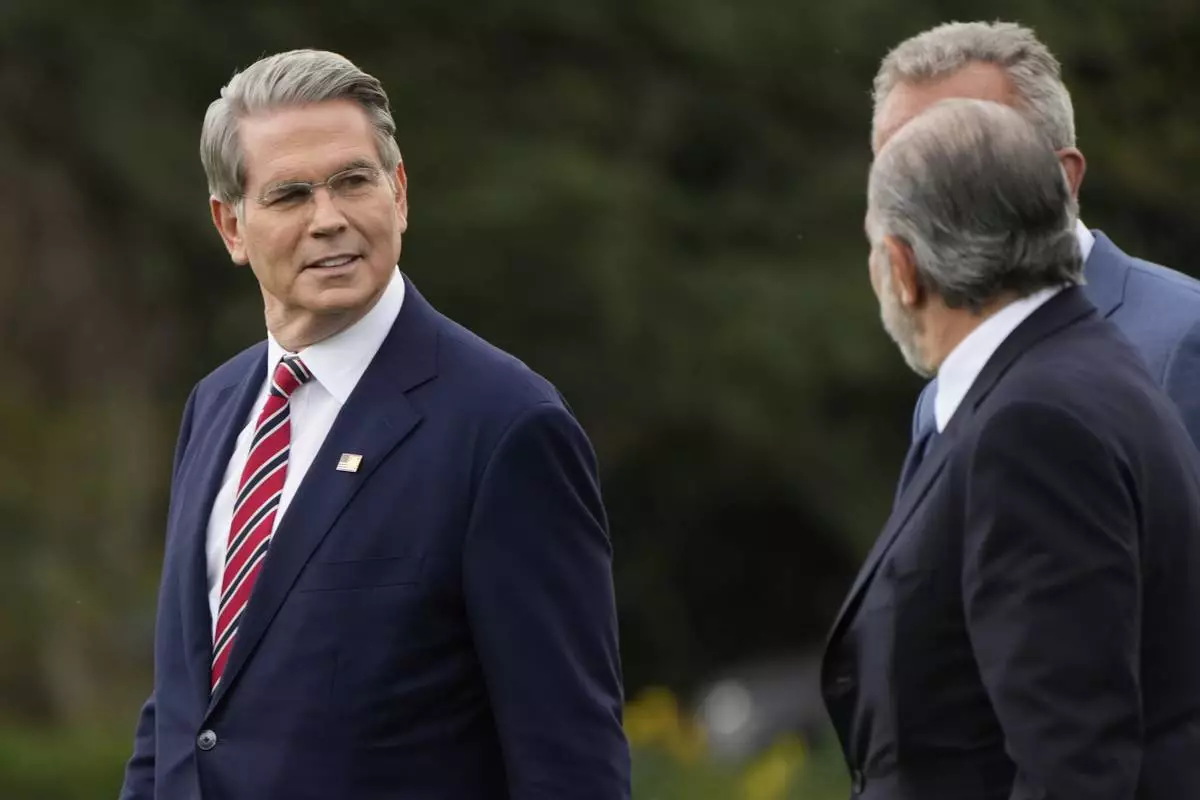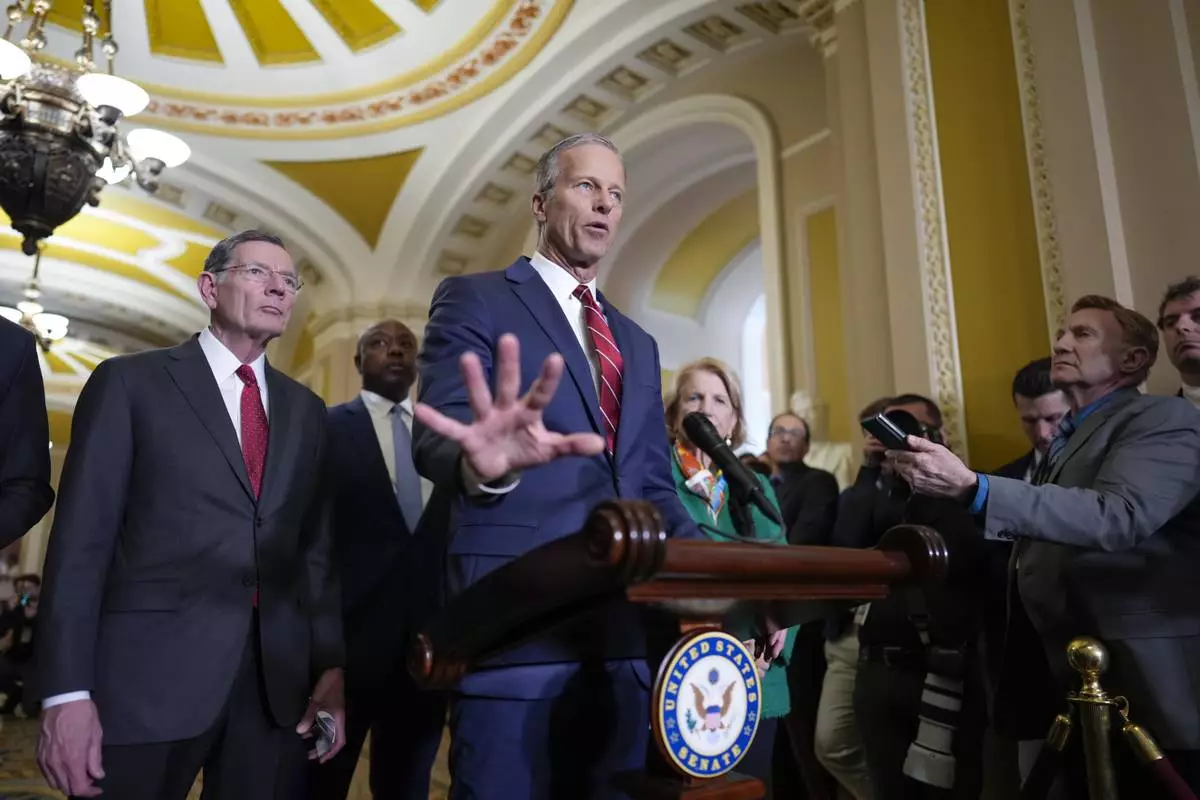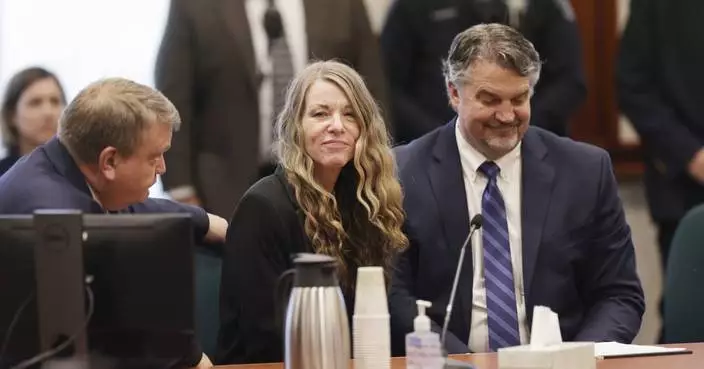WASHINGTON (AP) — Republican senators are meeting Wednesday morning with President Donald Trump at the White House as they push ahead on his big bill of tax breaks and spending cuts while delaying some of the most difficult decisions, including the costs and how to pay for the multitrillion-dollar package.
The Senate GOP’s budget framework would be the companion to the House Republicans' $4.5 trillion tax cuts package that also calls for cutting some $2 trillion from health care and other programs. If the Senate can move the blueprint forward, it would edge Trump's allies on Capitol Hill closer to a compromise setting the stage for a final product in the coming weeks.
“Obviously we are hopeful this week we can get a budget resolution on the floor that will unlock the process,” said Senate Majority Leader John Thune, R-S.D. “And so we are continuing to move forward with that.”
Thune and Republicans on the Senate Budget Committee are meeting with Trump before the expected public release of their budget blueprint by the committee chairman, Sen. Lindsey Graham of South Carolina, as soon as the afternoon.
While big differences remain, Republicans face increasing political pressure to deliver on what is expected to be Trump’s signature domestic policy package: extending the tax cuts, which were initially approved in 2017, during his first term at the White House. Those tax breaks expire at the end of the year, and Trump wants to expand them to include new no taxes on tipped wages, overtime pay and other earnings, as he promised during the 2024 campaign.
Democrats are preparing to oppose the GOP tax plans as giveaways to the wealthy, coming as billionaire Elon Musk's Department of Government Efficiency is taking a “chain saw” to the federal government. They warn Republicans plan to cut government programs and services that millions of Americans depend on nationwide.
“We are standing together against the GOP tax scam and in defense of the American people,” House Democratic leader Hakeem Jeffries said alongside others on the Capitol steps late Tuesday.
One main sticking point between the House and Senate GOP plans has been over whether the existing tax cuts, which are estimated to cost the federal government $4.5 trillion over the decade in lost revenue, need to be paid for by spending reductions elsewhere. Adding Trump's new tax breaks to the package would balloon the price tag.
To offset the costs, House Republicans are demanding some $2 trillion in cuts to health care and other accounts to stem federal deficits and prevent the nation's $36 trillion debt load from skyrocketing.
But GOP senators have a different approach. They take the view that because the tax cuts are already the current policy, they would not be new and would not need to be paid for. They want to use this current policy baseline moving forward, meaning only Trump's other proposed tax breaks would come with a new cost. They are expected to set much lower spending cuts as a floor that can be raised, if needed, to compromise with the House's $2 trillion in cuts.
Senate Minority Leader Chuck Schumer of New York and top Democrats call the Senate GOP's approach a gimmick at best, if not an outright “lie.”
“It is an obscene fraud and the American people won’t stand for it,” said Schumer, Sen. Jeff Merkley of the Budget Committee and Sen. Ron Wyden of the Finance Committee in a letter to GOP leadership.
Democratic Sen. Cory Booker of New Jersey argued against the GOP baseline as “a gimmick” that would cut important federal services while growing deficits.
“What they're investing in is bigger tax cuts for the wealthiest,” Booker said during a landmark overnight speech.
Treasury Secretary Scott Bessent and congressional GOP leaders have been meeting privately as Trump's priority package churns on Capitol Hill. At a meeting with other Senate Republicans late Monday at the Capitol, Bessent urged them to get it done.
Typically, the current policy baseline proposal would need to pass the muster of the Senate's nonpartisan parliamentarian to make sure it abides by the strict rules of the budget process. Senators from both parties have been arguing in closed-door sessions with the parliamentarian staff — for and against the idea.
But GOP leaders say they don’t necessarily need the Senate parliamentarian, at this point, to resolve the issue, and they believe Graham, as the Senate Budget Committee chairman, has the authority to allow their current policy baseline approach.
What is more certain is that they want to move quickly this week to pass the framework. That will entail a lengthy all-night vote that could drag into the weekend. Then, they will sort out the details later as the Republicans, facing Democratic opposition, build the actual package for consideration in the weeks, if not months, ahead.

From left, Treasury Secretary Scott Bessent, Health and Human Services Secretary Robert F. Kennedy Jr. and Commerce Secretary Howard Lutnick follow President Donald Trump to board Marine One on the South Lawn of the White House en route to Florida, Friday, March 28, 2025, in Washington. (AP Photo/Mark Schiefelbein)

Senate Majority Leader John Thune, R-S.D., joined by Sen. John Barrasso, R-Wyo., the GOP whip, left, talks to reporters at the Capitol, in Washington, Tuesday, April 1, 2025. (AP Photo/J. Scott Applewhite)



















































